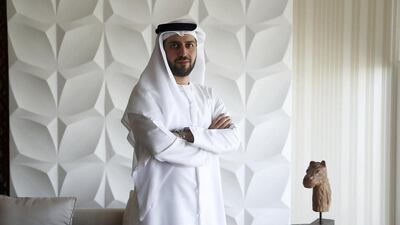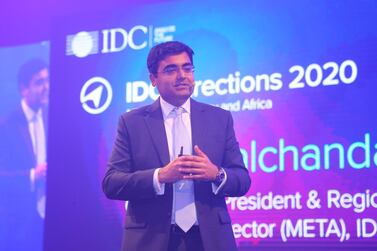Organisations in the Middle East and Africa are expected to spend $30 billion (Dh110.1bn) on digital transformation this year, driven largely by industries such as banking and energy.
"Total IT [information technology] spend in the MEA will be $90bn in 2020 and one-third of this will directly go towards digital transformation initiatives," Jyoti Lalchandani, group vice-president and managing director for MEA and Turkey at International Data Corporation, told The National.
The Massachusetts-based research company is expecting significant growth in technology investment in the coming years and projected that digital transformation spending will grow at a compound annual rate of 18 per cent in the region over the next three years.
With more number of industries, such as banking and energy, leveraging new technologies to transform their operations, “there would be a significant rise in digital transformation spending” said Mr Lalchandani.
The banking and finance industry will spend $13.23bn on technology this year but IDC forecasts this figure will reach $15.24bn by 2023, growing at a compound rate of 4.7 per cent.
Resource industries - including oil and gas mining - will spend $5.33bn on technology this year. This is predicted to grow to $5.79bn over the next three years.
Dubai Internet City, one of the investment zones in the emirates, foresees lack of good talent as a hindrance in the ongoing digital transformation drive.
“Our government is pushing digital transformation in a big way and positive results are before everyone… Dubai Internet City is also playing a crucial role in attracting new talent and technologies,” said Ammar Al Malik, managing director of DIC.

“But we still need to do more and the industry is facing a talent shortage,” said Mr Malik.
Currently, more than 25,000 people are working at DIC and the authorities expect this number to reach 40,000 in the next six to seven years.
Korn Ferry, a Los Angeles-based management consulting firm, predicted that there will be a global tech talent shortage of more than 85 million people, which is roughly equivalent to the population of Germany, over the next ten years. This could result in $8.5tn in unrealised revenues, it added.
A talent shortage will impact the region in two ways, said Mr Lalchandani.
“It will slow down the investment and force the companies to automate more. I won’t say that with automation there will be job cuts … rather, it will lead to job rationalisation as new kinds of jobs will be created and companies will be required to upskill their current staff,” he said.
Technology firms agree there is a skills gap in the region that is pushing back the speed of digitisation.
“Our regional customers face a lot of skill shortage … especially in the fields of performance-oriented jobs that involve quick trouble-shooting, analysing huge data and predicting future trends,” Charbel Khneisser, Middle East and North Africa regional director at Riverbed Technology, said.
“This is slowing the pace of digital transformation efforts,” he added.
California-headquartered Riverbed has more than 1,000 clients in the Middle East, with Saudi Arabia and the UAE – the Gulf’s largest economies – its biggest markets.
“To minimise the impact of talent shortage on the companies’ bottom line, we provide them monitoring tools or software to perform various tasks,” added Mr Khneisser.








